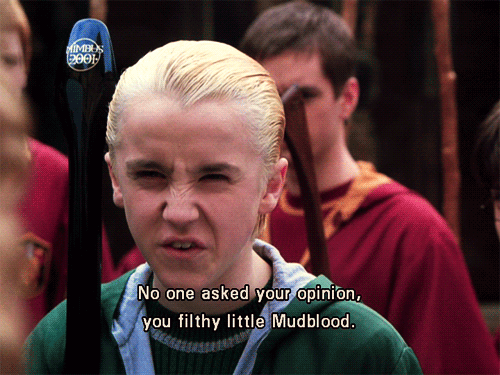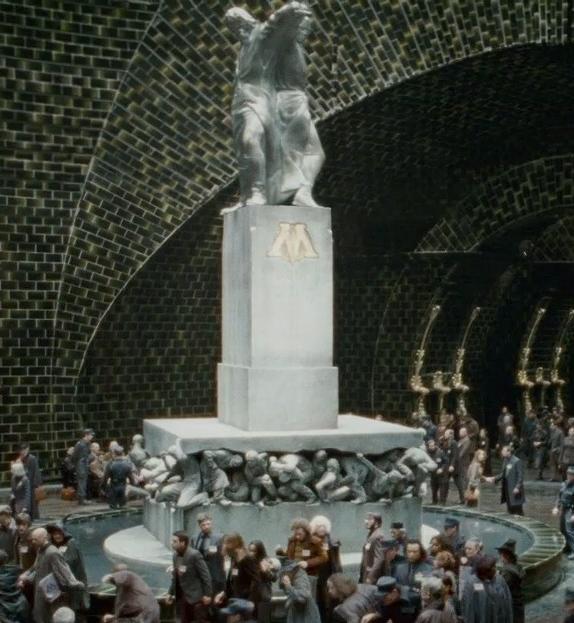When I started this blog, I told myself I have to write at least
one post dedicated entirely to Severus Snape, the Potions master that has
treated Harry Potter with hostility. I must admit that at first, I hated Snape
with a passion that almost exceeded that of my hatred for Voldemort. He, after
all, was the one who killed Professor Dumbledore, the greatest wizard ever
known to mankind. Of course, that is before I knew the whole story.
After reading the Half-Blood Prince, my mind kept racing with
questions. It made me anticipate the last book where everything would end. I
could only imagine the huge WTF expressions on every Potter fans out there when
the biggest turnabout in the history of Hogwarts was revealed in the Deathly
Hallows book. It turned out that everything Snape did, he did out of his
unrequited love for Harry’s mother, Lily Evans. With that, the Harry Potter
community – even the whole world who had witnessed the story’s progress –
started arguing on whether Severus Snape
was a hero or not.
Emily Asher-Perrin said Severus Snape DoesNot Deserve Your Pity. According to her, Snape should not be pictured as a
martyr with tortured soul either. Despite his apparent undying love for Lily,
Asher-Perrin still thinks that his actions did more damage than actually help.
The author further claimed that Snape’s despicable traits could be somehow
traced down to his troubled childhood, with him being the center of bullying of
James Potter and his gang, but that doesn’t condone the fact that he sent
Voldemort to kill Harry and James to gain personal advantage. What Snape didn’t
foresee is that Lord Voldemort would kill the woman he loved. It’s ironic,
Snape finally succeeded in removing James Potter, the bane of his existence,
only at the expense of the one woman he truly cared about.
“It’s what makes Severus Snape such a mesmerizing character in the first place. He doesn’t want to be coddled by anyone who feels for him, who wants to ease his pain. He would probably feel pretty awkward about Harry using his name to christen one of the Potter brood. Severus Snape doesn’t need pity because he’s not meant to be pitied—the owning of his failures are what make him exceptional,” said Emily Asher-Perrin.
It’s true that Asher-Perrin doesn’t see Snape
as a hero or a martyr. I can sympathize with her sentiments that Snape’s bitterness
had clouded his better judgment. It’s true that Snape had committed dreadful
acts ever since joining the Death Eaters. But there’s one thing that the author
and I had agreed on – that Snape is one of the great characters in the Harry
Potter world and that he doesn’t deserved to be pitied. Murder is murder, and
murder is a crime. No one was given the right to decide on their own in taking
other people’s lives.
On the other hand, Todd Fischer thought
otherwise. In his article The Redemption of Severus Snape, Fischer was pretty
adamant in his expression of his belief that Snape was indeed a hero. The
author mentioned that Snape had made a grave mistake when he sold James Potter
to Lord Voldemort, all because he wanted Lily Evans to himself. He, then
pointed out that this mistake of Snape’s came with a price. Fischer further
cited some instances that would paint Snape a hero. He mentioned how Snape had
always put his life on the line in saving Harry. All of this was because he
deeply loved Lily.
“Loyal, dedicated, brave and courageous. Words many likely never thought to apply to poor Severus. Truly Snape is one of the most tragic heroes of modern literature,” Fischer said.
I think that Snape was a seriously
misunderstood character, but it was really because of his own doing. He
despised being pitied and so, he chose to be hateful. There was more to him
than meets the eye. I was deeply touched to find out that Snape had always been
in love with Harry’s mother, Lily. Maybe because I’m a sucker for love, but it’s
probably more because of his courageous side. He didn’t want to admit it but he
had grown attached to Harry along the way. It was only his hatred for his
father that marred such poignant reality. And if I would be asked whether Snape is a hero or
not, I would gladly answer the former.










